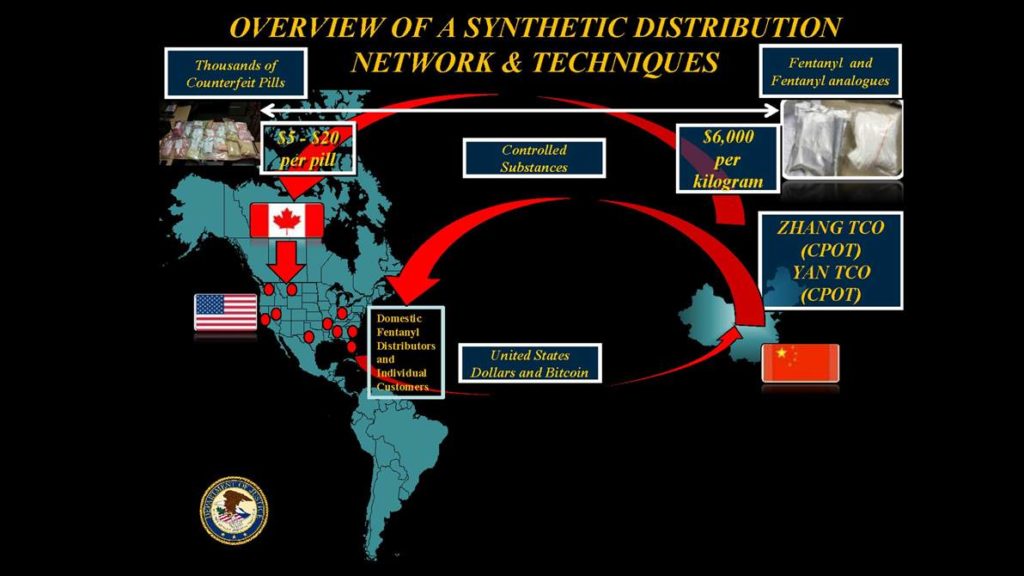2 Chinese Nationals Among 21 People Indicted in International Fentanyl Smuggling Rings
 In an unprecedented action, the U.S. Department of Justice (DOJ) has announced federal grand jury indictments against two Chinese nationals living and working in China. It is alleged the pair operated separate businesses that manufacture illicit fentanyl and fentanyl analogues and export them to the United States.
In an unprecedented action, the U.S. Department of Justice (DOJ) has announced federal grand jury indictments against two Chinese nationals living and working in China. It is alleged the pair operated separate businesses that manufacture illicit fentanyl and fentanyl analogues and export them to the United States.
The DOJ press release reports that a grand jury in Mississippi indicted Xiaobing Yan of China “on two counts of conspiracy to manufacture and distribute multiple controlled substances, including fentanyl and fentanyl analogues, and seven counts of manufacturing and distributing the drugs in specific instances.” According to the DOJ, Yan’s business was in operation for more than six years, and investigators identified more than 100 US-based distributors for Yan’s illicit fentanyl. The DOJ also notes that there are ongoing investigations in 10 different judicial districts into Yan’s illicit fentanyl smuggling operation.
The second Chinese national, Jian Zhang, was indicted in North Dakota with: “(1) Conspiracy to Possess with Intent to Distribute and Distribute Controlled Substances and Controlled Substance Analogues Resulting in Serious Bodily Injury and Death; (2) Conspiracy to Import Controlled Substances and Controlled Substance Analogues into the United States Resulting in Serious Bodily Injury and Death; (3) Money Laundering Conspiracy to Conceal the Nature, Location, and Ownership of Proceeds of Specified Unlawful Activity; and (4) International Money Laundering Conspiracy; and (5) Continuing Criminal Enterprise,” the DOJ announced on October 17.
The DOJ specifies that Zhang’s conspiracy began as an investigation into the death of an 18-year-old Grand Forks, North Dakota resident, Bailey Henke in 2015. According to Fox News, “Zhang allegedly ran at least four labs in China than manufactured fentanyl, and advertised and sold fentanyl to U.S. customers over the internet. Agents determined Zhang sent thousands of these packages of fentanyl, pill presses and stamps to people in the U.S. since January of 2013.”
21 other people were charged or are awaiting sentencing in the Zhang case, reports the DOJ, including five North Dakota residents, four Oregon residents, two Florida residents, and one person each from Washington, Georgia, and New Jersey. Additionally, a Colombian resident Daniel Vivas Ceron is awaiting trial, as well as five Canadians. 680News reports that two of the Canadians are currently in prison in Canada, yet they allegedly ran the “Canadian end” of the enterprise while incarcerated in the Drummond Institution in Drummondville, Quebec.
According to the Zhang indictment, “Members of the conspiracy sold controlled substance analogues across the United States including, but not limited to: North Dakota, Oregon, Florida, Georgia, North Carolina, New Jersey, California, South Carolina, Ohio, Colorado, Maryland, and elsewhere.”
The indictment also alleges, “To hide their financial transactions, co-conspirators used offshore accounts, anonymous virtual currency transactions, and third parties to move money, as well as using encrypted communication applications to discuss financial transactions; and The purpose of transferring currency in this fashion was to conceal and disguise the nature, source, ownership, and control of the proceeds from the trafficking of controlled substances and controlled substance analogues.”
According to the Washington Post, Deputy Attorney General Rod J. Rosenstein “said the Centers for Disease Control and Prevention estimated that more than 20,000 Americans were killed by fentanyl and fentanyl analogues in 2016. Investigators think nearly all of it and its components originate in China.”
In an April editorial in the Washington Examiner, Charlie Cichon, Executive Director of the National Association Investigators sounded the alarm on how the expanding U.S. fentanyl crisis could become far worse if drug importation proposals end up passing: “There’s simply no way U.S. agencies could ever regulate drugs that are outside the FDA’s purview. While importation of opioids will likely still be illegal, the products non-U.S. pharmacies sell may be little more than sugar pills or they could be poisonous substances; there’s simply no way to know and allowing their sale is sure to accelerate an already severe opioid crisis on America’s streets.”
The DEA, ICE Homeland Security Investigations, the Internal Revenue Service Criminal Investigation, the U.S. Postal Inspection Service and the RCMP are investigating the cases against Yan and Zhang. U.S. Customs and Border Protection and the Ministry of Public Security of China have also provided valuable investigative assistance. Assistant U.S. Attorney John Meynardie in the Southern District of Mississippi is prosecuting the case against Yan. U.S. Attorney Chris Myers and Assistant U.S. Attorney Scott Kerin in the District of North Dakota, along with Trial Attorney Adrienne Rose of the Criminal Division’s Narcotic and Dangerous Drug Section, are prosecuting the case against Zhang. The U.S. Attorney’s Office in the District of Oregon and the Quebec office of the Public Prosecution Service of Canada also provided substantial prosecutorial assistance.